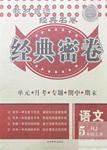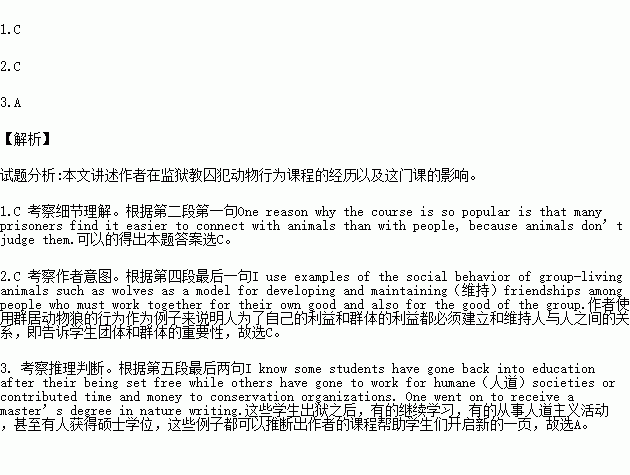题目内容
I have been teaching animal behavior at the Boulder County Prison in Colorado for 10 years. The course is one of the most popular in the prison. Prisoners have to earn the right to attend the course and they work hard to get in.
One reason why the course is so popular is that many prisoners find it easier to connect with animals than with people, because animals don’t judge them. They trust animals in ways they don’t with humans.
Yet, they hold a misunderstanding of how animals treat one another. Many admit that their own “animal behavior” is what got them into trouble in the first place. I teach that though there is competition and aggression in the animal kingdom, there is also a lot of cooperation(合作)and sympathy.
Many of the students want to build healthy relationships, and they find that the class helps them. I use examples of the social behavior of group-living animals such as wolves as a model for developing and maintaining(维持)friendships among people who must work together for their own good and also for the good of the group.
It’s clear that science inspires the students here and it also gives them hope. I know some students have gone back into education after their being set free while others have gone to work for humane(人道)societies or contributed time and money to conservation organizations. One went on to receive a master’s degree in nature writing.
Science and humane education help the prisoners connect with values that they otherwise would not have done. It opens the door to understanding, trust, cooperation and hope. There’s a large population of people to whom science could mean a lot, if only they could have access to it. The class helps me, too. I get as much out of it as the students and it has made me a better teacher.
1.The author’s course is welcomed by the prisoners because ______.
A. they consider animals their best friends
B. they are curious about animal kingdom
C. they feel it easier to get along with animals
D. they are more familiar with animal behavior
2.The author used wolves as an example to ______.
A. provide the prisoners with more knowledge
B. explain the cruel side of group-living animals
C. help the prisoners realize the importance of teamwork
D. inform the prisoners that animals get people into trouble
3.We can infer from the text that some prisoners ______.
A. have turned over a new leaf
B. are required to attend the course
C. are willing to learn working skills
D. prefer humane education to science
 作业辅导系列答案
作业辅导系列答案 同步学典一课多练系列答案
同步学典一课多练系列答案 经典密卷系列答案
经典密卷系列答案 金牌课堂练系列答案
金牌课堂练系列答案

 ),并在其下面写出该加的词。
),并在其下面写出该加的词。